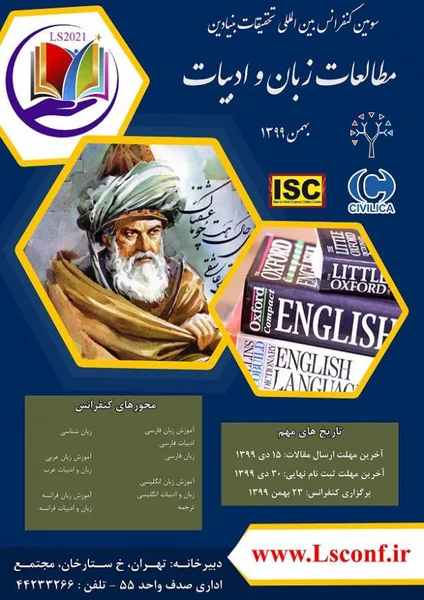-
herkes için pratik türkçe ( practical turkish for everyone )
جزئیات بیشتر مقاله- تاریخ ارائه: 1399/10/30
- تاریخ انتشار در تی پی بین: 1399/10/30
- تعداد بازدید: 78
- تعداد پرسش و پاسخ ها: 0
- شماره تماس دبیرخانه رویداد: -
herkes için pratik türkçe ( practical turkish for everyone)
in today’s global world, the importance of turkish can not be denied and ignored since turkish is an important language to learn. at present, there are between 61 and 73 million people in the world speaking turkish. it composes about 40% of a total number of all turkish-speaking people and makes turkish to be the first by the number of speakers among all turkic languages. turkish itself is spoken predominantly in the republic of turkey, of which it is the official language. no statistics are available as to how many of turkey’s population of 70 million have turkish as their first language. most of the ethnic minorities have undergone considerable (in some cases, total) linguistic assimilation. in the largest ethnic minority, that of the kurds (which is variously estimated to make up between 8 per cent and 20 per cent of the country’s population), a large number of people are bilingual. a reasonable estimate would probably be that turkish is now the first language of 55-60 million of turkey’s citizens, with another few million people speaking it with equal fluency to their native language.
because turkey is situated at the edge of the middle east, some people think that turkey is an arabic country but it is not an arabic country, the language of turkey is turkish. although there is a small arabic speaking minority in turkey. there are around 75 million native speakers of turkish that includes 10 to 15 million people in southeastern europe. that's mainly in the part of turkey that's located in europe but also as a minority language in the balkan area. and it includes 60 to 65 million people in anatolia that's the part of turkey which is located inside of asia, but there are other languages inside the turkic language family that have a relatively high degree of mutual intelligibility and some people consider those languages to be dialects of turkish. so, if we include those, the number might be as high as 100 million people. because turkey is located partly inside of europe, you might have thought that turkish is an indo-european language or a slavic language. and because part of turkey is located on the edge of the middle east, you might have thought that turkish is a semitic language but it is not. the turkish language family is a separate family unto itself. the turkic languages are sometimes thought to be a part of a larger language family called the altaïc language family which includes some other language groups, like the mongolic language family amongst others but this is not a generally accepted theory by linguists. it tends to be debated and these days, it seems to be fairly discredited. turkish is a part of the oghuz branch of the turkic language family. it also includes azerbaijani which is sometimes called azeri turkish, as well as turkmen as well as some other languages like qashqai which is spoken in some parts of iran. the languages of the oghuz branch are all mutually intelligible to some extent and these are the languages that are sometimes considered to be dialects of turkish. azeri turkish is spoken in azerbaijan as well as parts of iran, dagestan and gorgia and it has 26 million native speakers.
مقالات جدیدترین رویدادها
-
استفاده از تحلیل اهمیت-عملکرد در ارائه الگوی مدیریت خلاقیت سازمانی و ارائه راهکار جهت بهبود
-
بررسی تاثیر ارزش وجوه نقد مازاد بر ساختار سرمایه شرکت های پذیرفته شده در بورس اوراق بهادار تهران
-
بررسی تأثیر سطح افشای ریسک بر قرارداد بدهی شرکت های پذیرفته شده در بورس اوراق بهادار تهران
-
بررسی تأثیر رتبه بندی اعتباری مبتنی بر مدل امتیاز بازار نوظهور بر نقد شوندگی سهام با تأکید بر خصوصی سازی شرکت ها
-
تأثیر آمیخته بازاریابی پوشاک ایرانی بر تصویر ذهنی مشتری پوشاک ایرانی (هاکوپیان)
-
پاسخ ساختگاه ناهمسان تحت اثر امواج sh مایل به روش تفاضلات متناهی
-
نقش مشارکت شهروندان در مسیر طرح های توسعه شهری
-
هپاتیت ویروسی نوع b در ایران اپیدمیولوژی، مکانسیم آسیب سلول های کبدی و سیر بالینی
-
بررسی و ارزیابی اثرات زیست محیطی احداث سد سردشت (آذربایجان غربی)
-
microstructure and properties of austenitic stainless steel reinforced with in situ tic particulate
مقالات جدیدترین ژورنال ها
-
مدیریت و بررسی افسردگی دانش آموزان دختر مقطع متوسطه دوم در دروان کرونا در شهرستان دزفول
-
مدیریت و بررسی خرد سیاسی در اندیشه ی فردوسی در ادب ایران
-
واکاوی و مدیریت توصیفی قلمدان(جاکلیدی)ضریح در موزه آستان قدس رضوی
-
بررسی تاثیر خلاقیت، دانش و انگیزه کارکنان بر پیشنهادات نوآورانه کارکنان ( مورد مطالعه: هتل های 3 و 4 ستاره استان کرمان)
-
بررسی تاثیر کیفیت سیستم های اطلاعاتی بر تصمیم گیری موفق در شرکتهای تولیدی استان اصفهان (مورد مطالعه: مدیران شرکتهای تولیدی استان اصفهان)
-
بررسی نقش تعدیل گر ارتباطات سیاسی بر رابطه بین ریسک سقوط قیمت سهام و هزینه سرمایه در شرکت های پذیرفته شده در بورس اوراق بهادار تهران
-
ارائه اصول "سبک طراحی فرایندی، مبتنی بر واقعیت" در معماری
-
سنجش رضایت مشتری به منظور افزایش فروش با استفاده از داده کاوی؛ مطالعه موردی در صنایع کاشی و سرامیک استان قزوین
-
comparison of the efficacy and rate of ondansetron with meperidine in the treatment of shivering after general anesthesia after heart surgery
-
a practical model to improve the understanding of the information contained in the financial statements using the visual arts




سوال خود را در مورد این مقاله مطرح نمایید :